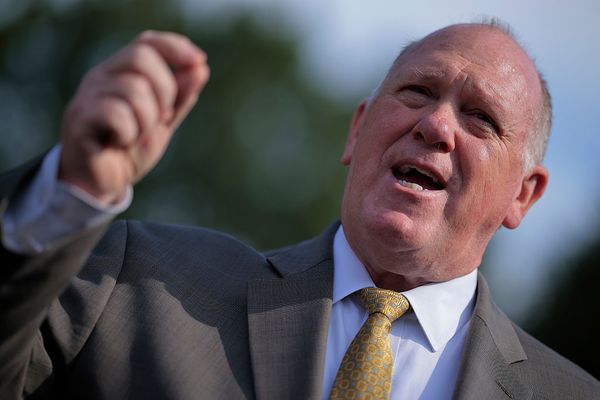U.K. Prime Minister Liz Truss is still officially in charge, but hardly seems to be in control.
The big picture: Truss unleashed chaos in the financial markets three weeks ago with a plan to slash taxes while simultaneously funding massive energy subsidies. Her finance minister is now gone, along with most of that plan and arguably her authority.
Driving the news: It was not Truss but House of Commons leader Penny Mordaunt who appeared before Parliament today to explain the departure of Truss' close ideological ally Kwasi Kwarteng as Chancellor of the Exchequer.
- Mordaunt said Truss had been detained by "urgent business," then later clarified, perhaps unhelpfully, that "the prime minister is not under a desk."
- Kwarteng's replacement, Jeremy Hunt — a relative moderate picked in part because he's not loyal to Truss — then stepped up to the dispatch box to explain that "nearly all" of Truss' trademark tax cuts would be reversed. Truss did turn up and sit silently at Hunt's side for a time before departing to jeers.
How it happened: Truss won the inter-party race to replace Boris Johnson by promising "bold" tax cuts, including for the rich, in order to boost economic growth.
- Truss' leadership rival Rishi Sunak had warned that she risked supercharging inflation and forcing up interest rates — claims she dismissed as “project fear” from the “anti-growth coalition.”
- In practice, the Truss-Kwarteng package spooked the markets so badly that the Bank of England staged an emergency intervention to ease a run on the pound.
- Unable to steady the situation, Truss took the humiliating step of handing economic policy over to Hunt.
State of play: Hunt acknowledged today that the government was partially to blame for the U.K.'s dire fiscal straits and said "nothing is off the table" — including potentially scrapping Truss' funding pledges for defense and pensions — to restore "stability." His performance seemed to calm the markets, for now.
- Much damage has already been done. As Axios chief economic correspondent Neil Irwin notes, Brits are facing higher mortgage costs due to the chaos Truss unleashed without getting the tax cuts she promised.
- Polls now consistently put the Conservatives more than 30 points behind Labour. Remarkably, one new poll out today finds that just 21% of 2019 Conservative voters think Truss would be a better prime minister than Labour leader Keir Starmer.
With her platform shredded and Hunt now overseeing the economy, the question Truss keeps getting from journalists (and some Conservative MPs) is, "Why are you still here?"
- Voters generally feel the same way, says James Johnson, whose firm JL Partners has been conducting focus groups on Truss. "There was anger toward Boris Johnson. With Liz Truss, it's more despair. People think she's not up to the job."
- Worse still, voters don't think she's looking out for them, Johnson says. "You have to be caring or competent," he says. "She's lost both."
What to watch: The Westminster consensus is increasingly that Truss is on her way out, but with no election due for two years, members of Parliament from her own party would have to give her the shove. Johnson thinks that could happen within days, and will almost certainly happen before the next general election.
- It's unclear if Conservative MPs would be able to coalesce around a single candidate — such as Sunak or Hunt — to avoid another leadership contest so soon. Other possible contenders include Mordaunt and Defense Secretary Ben Wallace.
The latest: Truss told the BBC this evening that "mistakes were made," but she had acted in the national interest to rectify them and will lead her party into the next general election.
Worth noting: If Truss is forced out, the U.K. will have its fifth prime minister since the 2016 Brexit referendum — as many as in the previous 37 years.







